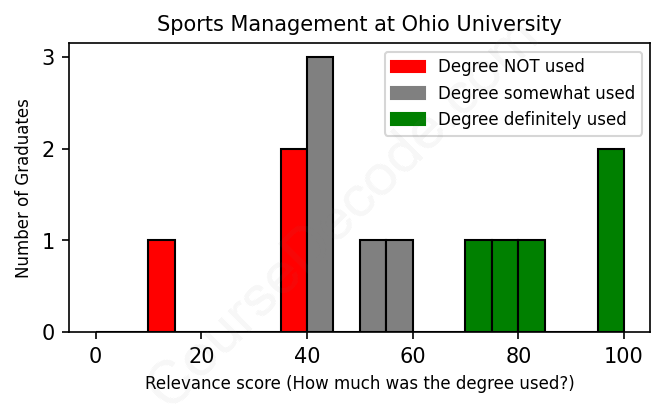
First, some facts. Of the Sports Management graduates from Ohio University we've analyzed , here's how many have used (or NOT used) their degree in their career:

These are estimates based on AI analysis of 13 LinkedIn profiles (see below).
The verdict? Below average. Overall, with an average relevance score of 57%, Sports Management graduates from Ohio University have a lower likelihood (-10%) of finding work in this field compared to the average graduate across all fields:
And for comparison, here's the chart for all profiles we've looked at across all degrees.
Also, after graduating, 46% of these graduates have pursued further education other than another Bachelor's degree (such as a Masters degree or other), compared to the average across all profiles of 35%. This suggests you may need more than just a Bachelors degree to be competitive as a Sports Management graduate.
See the details:
|
Relevance score: 96% We think this person has gone into a career highly relevant to their degree. We think this person has gone into a career highly relevant to their degree.
DEGREE INFOGraduated in 2012 from Ohio University with a Bachelor's degree in Sports Management. Also pursued further education since (see below). JOB HISTORY SINCE GRADUATIONVolunteer Assistant Cornell University Jul 2013 - Mar 2014 Goaltending/Assistant Coach  Connecticut College Nov 2014 - Apr 2016 Goaltending Coach  Brown University Sep 2016 - Mar 2017 Goaltending Coach  University of Connecticut Sep 2017 - Feb 2020 Director of Coaching  Pro Crease Goaltending Sep 2014 - Jun 2023 Goaltending Development Coordinator  USA Hockey May 2020 - Apr 2023 Goaltending Director-New England District  USA Hockey Mar 2020 - Present FURTHER DEGREES DONE SINCE GRADUATINGMaster's degreeOhio University 2012 - 2013 ABOUTNo information provided. |
The top 10 most common jobs done by the graduates we've analyzed (ranked most common to least) are:
When looking at the job trajectories of graduates with a degree in Sports Management from Ohio University, a few common themes emerge. Many alumni have found work in the sports management field through roles like coaching, event management, or sales, especially in organizations directly tied to sports teams, like the Columbus Blue Jackets. Positions like Goaltending Coaches or Account Executives in sports marketing illustrate a direct application of their education, utilizing skills in coaching, player development, and sales techniques tailored specifically for the sports industry. These jobs typically involve active engagement with sports programs and athletes, making them very relevant to what they learned in college.
However, it's interesting to note that not all graduates have landed jobs that align perfectly with their major. Many ended up in roles that, while they utilize some management skills, are more focused on fields like healthcare, retail operations, or even logistics, which don't directly tie back to sports management principles. Positions such as Central Transport Coordinator and various roles at DICK'S Sporting Goods show a divergence from the core values of the Sports Management degree. So, while there are definitely successful examples of alumni pursuing careers in sports, there's also a significant number who have found themselves in unrelated industries. Overall, it's a mixed bag—some graduates are closely aligned with their studies, while others have ventured quite far from the field of sports management.
Here is a visual representation of the most common words in job titles for Sports Management graduates (this is across all Sports Management graduates we've analyzed, not just those who went to Ohio University):

Looking at the career trajectories of Sports Management graduates from Ohio University, there’s a mixed bag of paths these folks have taken post-graduation. Many of the first jobs for graduates seem to lean into areas connected to sports, such as coaching, ticket sales, and event promotions. For example, graduates who went into coaching roles, like goaltending coaches, seem to stay within the realm of sports, often moving up to more significant positions, like directors of coaching at various hockey organizations. Similarly, some early career roles in ticket sales and account management shows a direct correlation to their degree, which is a promising sign for those interested in a sports-related career.
However, it’s also worth noting that not all graduates have remained within the sports industry. Several have taken roles in management and compliance within unrelated fields, like financial services and retail operations. Over the span of five to ten years, many of these individuals appear to have transitioned into positions with greater responsibility, but often in positions that don’t directly tie back to sports management. This indicates that while some graduates do find success in sports-related careers, the landscape is broad enough that others may veer off into different sectors entirely, which isn't uncommon in any field. So, if you're considering a degree in Sports Management, be aware that while there are great opportunities in the sports industry, some graduates end up in various roles that might not be directly related to their studies.
Honestly, getting a Bachelor’s degree in Sports Management at Ohio University is pretty manageable, especially if you’re passionate about sports and enjoy learning about the business side of it all. The coursework includes a mix of classes in marketing, finance, management, and even some hands-on experiences, which makes it more engaging than just traditional textbook learning. While it definitely has its challenges—like balancing projects, group work, and perhaps a few tough exams—if you stay on top of your assignments and are genuinely interested in the subject, it’s not overly difficult. Overall, I'd say it's a bit easier than some other majors, especially if you like what you’re studying!
Most commonly, in the LinkedIn profiles we've looked at, it takes people 4 years to finish a Bachelor degree in Sports Management.
So, looking at the career paths of these Ohio University sports management graduates, it seems like they've been making some decent money, especially the ones who have climbed the corporate ladder in established companies. For instance, the folks who moved into managerial or executive roles, like the Business Operations Manager at OhioHealth and the Senior Global Account Executive, likely have salaries that are pretty good, considering their responsibilities. On the flip side, some earlier roles, like coaching positions or internships, might not have paid as well initially since entry-level jobs in sports are often less lucrative. Overall, it looks like they’re finding their footing and moving towards better-paying jobs, which is pretty promising!
Here is a visual representation of the most common words seen in the "about" section of LinkedIn profiles who have a Bachelor degree in Sports Management (this is across all Sports Management graduates we've analyzed, not just those who went to Ohio University). This may or may not be useful:

Here are all colleges offering a Bachelor degree in Sports Management (ordered by the average relevance score of their Sports Management graduates, best to worst) where we have analyzed at least 10 of their graduates: